|
|
|
Sort Order |
|
|
|
Items / Page
|
|
|
|
|
|
|
| Srl | Item |
| 1 |
ID:
133617
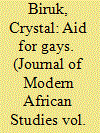

|
|
|
|
|
| Publication |
2014.
|
| Summary/Abstract |
In recent years, 'African homophobia' has become a spectacle on the global stage, making Africa into a pre-modern site of anti-gay sentiment in need of Western intervention. This article suggests that 'homophobia' in post-2009 Malawi is an idiom through which multiple actors negotiate anxieties around governance and moral and economic dependency. I illustrate the material conditions that brought about social imaginaries of inclusion and exclusion - partially expressed through homophobic discourse - in Malawi. The article analyses the cascade of events that led to a moment of political and economic crisis in mid-2011, with special focus on how a 2009 sodomy case made homophobia available as a new genre of social commentary. Employing discourse analysis of newspaper articles, political speeches, the proceedings of a sodomy case, and discussions about men who have sex with men (MSM) as an HIV risk group, I show how African homophobia takes form via interested deployments of 'cultural' rhetoric toward competing ends. This article lends a comparative case study to a growing literature on the political and social functions of homophobia in sub-Saharan Africa.
|
|
|
|
|
|
|
|
|
|
|
|
|
|
|
|
| 2 |
ID:
133618
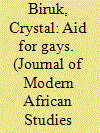

|
|
|
|
|
| Publication |
2014.
|
| Summary/Abstract |
In recent years, 'African homophobia' has become a spectacle on the global stage, making Africa into a pre-modern site of anti-gay sentiment in need of Western intervention. This article suggests that 'homophobia' in post-2009 Malawi is an idiom through which multiple actors negotiate anxieties around governance and moral and economic dependency. I illustrate the material conditions that brought about social imaginaries of inclusion and exclusion - partially expressed through homophobic discourse - in Malawi. The article analyses the cascade of events that led to a moment of political and economic crisis in mid-2011, with special focus on how a 2009 sodomy case made homophobia available as a new genre of social commentary. Employing discourse analysis of newspaper articles, political speeches, the proceedings of a sodomy case, and discussions about men who have sex with men (MSM) as an HIV risk group, I show how African homophobia takes form via interested deployments of 'cultural' rhetoric toward competing ends. This article lends a comparative case study to a growing literature on the political and social functions of homophobia in sub-Saharan Africa.
|
|
|
|
|
|
|
|
|
|
|
|
|
|
|
|
| 3 |
ID:
065968
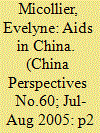

|
|
|
| 4 |
ID:
067372
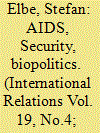

|
|
|
| 5 |
ID:
107192
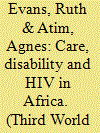

|
|
|
|
|
| Publication |
2011.
|
| Summary/Abstract |
Recent research and policy have recognised the central role of unpaid care-givers (often women and girls) in the global South. Disability rights perspectives, however, challenge the language of 'care' and 'dependence'. Drawing on qualitative research with women living with HIV and children caring for them in Tanzania, and on learning from the National Community of Women Living with HIV and AIDS in Uganda (NACWOLA), this paper explores the divergences and interconnections between the concepts and practices of care, disability and HIV in the context of East Africa. Despite the development of interdependent caring relations, both care-givers and people living with HIV in Tanzania experience 'diminished autonomy'. The participation of people living with HIV, including disabled people, in home-based care and in peer support groups, however, can enhance 'relational autonomy' for both care-givers and care-recipients. We reflect on opportunities and challenges for mutual learning and cross-movement advocacy by disabled people, people living with HIV and care-givers.
|
|
|
|
|
|
|
|
|
|
|
|
|
|
|
|
| 6 |
ID:
086624
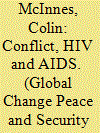

|
|
|
|
|
| Publication |
2009.
|
| Summary/Abstract |
The argument that there is a link between conflict and the spread of HIV has become commonplace in both the academic and policy world. This article examines five key reasons offered for this link: the high HIV prevalence in many militaries; that conflict leads to migration which acts as a vector for the spread of the disease; the changes in sexual behaviour introduced by conflict, including increased incidence of rape; reduced health provision and support as a result of conflict; and the risks introduced in post-conflict settings. The article argues that these reasons offer a poor explanation as to why HIV is spread in some conflicts but not others and develops a new model to explain when conflict might lead to the spread of HIV.
|
|
|
|
|
|
|
|
|
|
|
|
|
|
|
|
| 7 |
ID:
157197
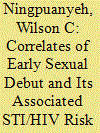

|
|
|
|
|
| Summary/Abstract |
This study explores the correlates of early sexual debut and risk factors of sexually transmitted infections (STIs) among the youth in Malawi. Data was obtained from the Malawi Demographic Health Survey 2010. Out of a sample of 2987 males and 9559 females aged 15–24 years, 1405 males and 5217 females were considered. Chi-square and multivariate analysis was performed and findings presented by gender. The results indicate that females aged 15–19 years (OR=4.18), who were Muslims (OR=1.42), with no education (OR=3.99), were significantly more likely to initiate sexual debut early. Meanwhile, males aged 15–19 years (OR=3.50), from the northern region (OR=2.35) and of the Chewa ethnic group (OR=1.45) were significantly more likely to initiate sexual debut early. Muslims males (OR=0.57), from the poorest (OR=0.69) households were significantly less likely to initiate sexual debut early. Females who initiate sex earlier form a distinct risk group in this study. Specific intervention is therefore needed for young females in their early teen years before they initiate sexual debut.
|
|
|
|
|
|
|
|
|
|
|
|
|
|
|
|
| 8 |
ID:
139540
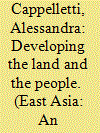

|
|
|
|
|
| Summary/Abstract |
Social development in Xinjiang Uyghur Autonomous Region from 1999 to 2009 is the focus of this article. I will explore the current situation among Uyghurs and Hans living in Xinjiang in different social contexts and purviews, mainly assessing problems and open questions hindering a balanced and consensus-based social development in the area. The concept of “development” per se will be understood with a critical perspective. The fieldwork was conducted in 2011 and 2012 in Urumqi, Turpan, Kahsgar, Wujiaqu and Shihezi, and in eight rural villages—seven located in the Kashgar Prefecture and one in Kizilsu Kyrgyz Autonomous Prefecture. The opportunity to adopt an “insider perspective”, at the same time working with critical tools provided by the disciplines of sociology and anthropology, can be considered an important asset in the field of Xinjiang studies. My PhD research in China (2010–2013) and my work as consultant for KFW (2011–2012) have been of great help in adopting this approach. Interviews, participant observation and analysis of quantitative and qualitative data from different sources are the basis of the fieldwork results presented here. UNDP indicators and indexes are taken as reference in setting and organising data.
|
|
|
|
|
|
|
|
|
|
|
|
|
|
|
|
| 9 |
ID:
095196
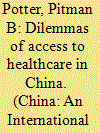

|
|
|
| 10 |
ID:
080123


|
|
|
|
|
| Publication |
2007.
|
| Summary/Abstract |
Over the last decade evidence has emerged suggesting that in many countries fisherfolk, as an occupational group, are at greater risk to HIV and AIDS than the general adult population. This high vulnerability has been explained in terms of the lifestyles associated with fishing and related occupations, such as fish processing and trading. Fishermen have been portrayed as risk takers, their attitudes and behaviour shaped by the physical and economic risks of the fishing lifestyle. Women in fishing communities, often engaged in fish processing and trading and providing food and lodging in fishing settlements, are portrayed as being in subordinate social and economic positions and prey to sexual exploitation by cash-rich fishermen. There is a danger in such lifestyle summaries that fisherfolk are characterized as feckless risk takers with a reckless attitude to the chance of contracting HIV. In this article we look at the lives of some men, women, and children living in a lake-side community in Uganda severely affected by HIV and AIDS to illustrate how existing portrayals of fisherfolk, and fishing communities, need to avoid stereotypes in order to better inform appropriate health sector and livelihood support measures
|
|
|
|
|
|
|
|
|
|
|
|
|
|
|
|
| 11 |
ID:
125958
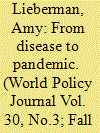

|
|
|
|
|
| Publication |
2013.
|
| Summary/Abstract |
MANGALSEN, Nepal-Most locals walk here, journeying hours or days to reach a smattering of tea shops and convenience stores or an ammonia-washed health clinic. Outsiders access the western Nepali district of Achham either by helicopter or the single road clinging precariously to the rocky corners of the Himalayan Mountains. People in Achham have no choice but to eat the little that sprouts from their stubborn land. Here, many know HIV only as "Bombay disease," a seemingly mysterious illness that began to weaken and kill in Achham when men started migrating to India for short-term, low-wage jobs more than a decade ago.
|
|
|
|
|
|
|
|
|
|
|
|
|
|
|
|
| 12 |
ID:
138556
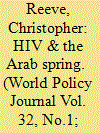

|
|
|
|
|
| Summary/Abstract |
CAIRO—Mona Iraqi, an outspoken filmmaker turned television presenter, goes in for the kill. She had been staking out a Cairo bathhouse for some time. A hidden camera had recorded enough damning evidence to condemn the place. And now it’s time for action. Iraqi and a cameraman join Egyptian security forces as they raid the hammam. Dozens of bare-chested men, hands covering their faces, are herded out of the place while Iraqi and her crew record the sting operation’s climax for her show, “El-Mestakhabi” (“The Hidden”).
|
|
|
|
|
|
|
|
|
|
|
|
|
|
|
|
| 13 |
ID:
069375
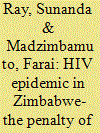

|
|
|
| 14 |
ID:
102425
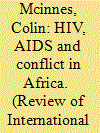

|
|
|
|
|
| Publication |
2011.
|
| Summary/Abstract |
The causes and consequences of HIV and AIDS are social are well as biomedical. Given the scale of the pandemic, understanding the social dimensions of HIV and AIDS is vital. One key argument is that there is a link between conflict and the spread of HIV. This appears to be particularly the case for sub-Saharan Africa where high levels of HIV prevalence are matched by violent conflict and state instability. Recent evidence however suggests that HIV prevalence does not always increase in conflict and that in some instances it may even reduce. This article attempts to explain why HIV has not increased in some sub-Saharan conflicts. To do this it moves beyond the use of risk factors to offer a new explanation based on susceptibility and vulnerability. It uses this explanation to examine four cases - Sierra Leone, Angola, Rwanda and the Democratic Republic of the Congo (DRC) - where conflict did not lead to a significant increase in the prevalence of HIV. The article concludes that, despite the fears of a few years ago, conflict does not readily act as a vector for the spread of HIV, though the potential for this to occur does still exist under certain circumstances.
|
|
|
|
|
|
|
|
|
|
|
|
|
|
|
|
| 15 |
ID:
095127
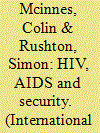

|
|
|
|
|
| Publication |
2010.
|
| Summary/Abstract |
HIV/AIDS is one of the greatest single causes of death and suffering on the planet. Over the last decade the societal impact of HIV/AIDS has been widely discussed in terms of national and international security. This article assesses the securitizing move and suggests that HIV/AIDS was only partially securitized at best and both the political consensus and strength of evidence were overestimated. It argues for greater nuance in our understanding of the link between HIV/AIDS and security, and the effects of its securitization, suggesting that neither is straightforward, and both are subject to case sensitivities.
|
|
|
|
|
|
|
|
|
|
|
|
|
|
|
|
| 16 |
ID:
149486
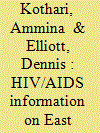

|
|
|
|
|
| Summary/Abstract |
According to the UNAIDS Global Report of 2010, Sub-Saharan Africa has about 22.5 million people living with HIV/AIDS. In a textual analysis of government-sponsored and private websites originating in East Africa, we analyze how the Internet and social media tools are used to disseminate information about HIV/AIDS and promote social change among targeted audiences. Our analysis found that content available on selected government and private websites, with minor exceptions, is generally not updated frequently nor systematically targeted specifically to those who can benefit most from the information. The government-initiated websites were populated with information that highlighted national strategic plans and focused on evaluation reports, while the private organizations provided information that in some instances was customized for specific audiences, but overall encouraged grassroots collaborations.
|
|
|
|
|
|
|
|
|
|
|
|
|
|
|
|
| 17 |
ID:
156537
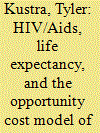

|
|
|
|
|
| Summary/Abstract |
This article views death in battle as an opportunity cost whose size is determined by the number of years a rebel would have lived as a civilian. As civilian life expectancy declines, this opportunity cost does too, increasing the probability of rebellion. This theory is tested with a tragic natural experiment: the HIV/AIDS epidemic in sub-Saharan Africa. Using male circumcision rates as an instrument for life expectancy, the analysis shows that a one-year increase in life expectancy decreases the probability of civil war by 2.6 percentage points. This supports the theory that opportunity costs are important determinants of conflict onset and that nonpecuniary opportunity costs should be taken into account. This article concludes by noting that cost–benefit analyses of public health interventions should include decreases in the probability of civil war, and the attendant benefits in terms of lives saved and material damage prevented, in their calculations.
|
|
|
|
|
|
|
|
|
|
|
|
|
|
|
|
| 18 |
ID:
109511
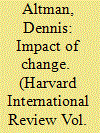

|
|
|
| 19 |
ID:
086706
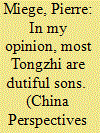

|
|
|
|
|
| Publication |
2009.
|
| Summary/Abstract |
Based on interviews with young homosexuals in Hefei, Anhui Province, this article examines the precarious modes of socialisation of young tongzhi(a term often used by gay people to refer to themselves), centred on the Internet and small groups of friends. The difficulty they have in constructing an identity based on sexuality stands out in the context of social norms and roles they cannot resolve to defy, above all because of their feelings of respect and duty towards their parents.
|
|
|
|
|
|
|
|
|
|
|
|
|
|
|
|
| 20 |
ID:
053898
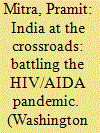

|
|
|
|
|
|
|
|